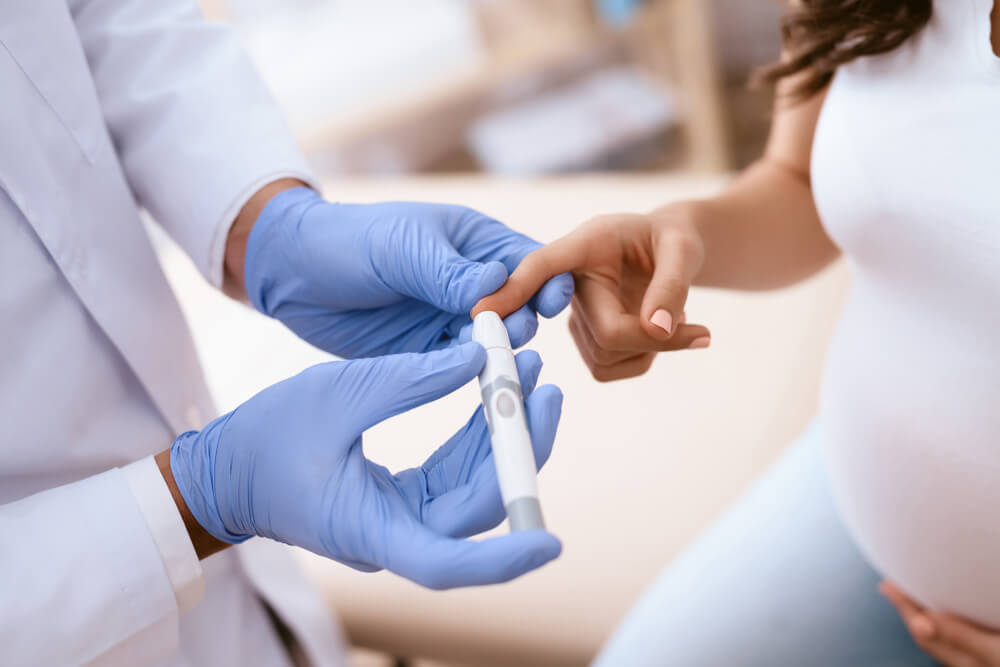Providers of prenatal care can spot gestational diabetes with a simple glucose check. The procedure entails consuming a sugary solution and having blood drawn. Your doctor or midwife will do this test somewhere during the second trimester.
The glucose tolerance test requires many blood draws at set intervals over three hours. You’ll need to fast for the test for a couple of hours. The term “3-hour glucose test” is sometimes used to describe the glucose tolerance test.
To secure the best obstetrician in Pembroke Pines, FL, and check your sugar levels in pregnancy, don’t hesitate to contact Advanced OBGYN Institute.
Glucose Test in Pregnancy: What Is It?
Up to 10 percent of expectant mothers develop gestational diabetes. It’s a sign of high blood sugar levels in pregnancy. Doing a glucose test when pregnant is important as it can identify symptoms of gestational diabetes. It’s vital to get your gestational diabetes under control because it can harm both you and the baby if it goes untreated.
Namely, your doctor may suggest a glucose challenge test (1-hour glucose test) or a glucose tolerance test (3-hour glucose test) to check your blood sugar levels in pregnancy.
The first test is only a screening, which is the primary distinction between the tests. It alerts your doctor about the possibility that you may have gestational diabetes. In the event that your screening test returns abnormal, your doctor will want to conduct additional testing. If it returns to normal, no further tests are necessary. Gestational diabetes can be identified with the second test. However, both tests require patients to ingest a glucose-containing drink and take blood from an arm vein.
The glucose drink, which tastes like flat soda or super sugary Gatorade, may be unpalatable, but it has no negative impact on most patients. It has been reported to cause nausea and dizziness in some people, but significant adverse reactions are unlikely.
What to Expect From Glucose Test When Pregnant?

A 3-hour glucose tolerance test differs from the glucose screening test in that participants are not required to begin consuming the sugary solution immediately. A lab technician will first check your blood sugar while you’re fasting to get the results on an empty stomach.
Next, you’ll down a sugary drink (glucola) with 100 grams of glucose as fast as possible (within five minutes). Your blood will be drawn at one, two, and three hours following the intake.
While waiting for your next blood draw, you must remain in the facility. Bring something to keep yourself occupied, like a book, a magazine, or something else. Drinking water is typically permitted during the testing process. Nonetheless, you will not be allowed to consume food until your final blood draw.
Optimal Range of Glucose Test in Pregnancy
The duration of the glucose screening test is approximately one hour. The glucose tolerance test typically lasts a bit longer than three hours.
Normal Range for Glucose Screening Test
Normal blood glucose levels are considered to be less than 140 mg/dL. There is no need to undergo any further tests in this case. Your doctor will suggest the 3-hour glucose tolerance test if your blood sugar level is 140 mg/dL or above.
Note that various service providers’ reference intervals and normal values may vary. Some medical professionals, for instance, view anything over 135 mg/dL as problematic.
Normal Range for Glucose Tolerance Test
In the case of a 3-hour glucose tolerance test, the normal blood sugar levels should be:
- Lower than 95 mg/dL when fasting
- Lower than 180 mg/dL (one-hour mark)
- Lower than 155 mg/dL (two-hour mark)
- Lower than 140 mg/dL (three-hour mark)
Gestational diabetes is often diagnosed when two or more results show abnormalities. If you have a single abnormal result, your doctor may want to retest you after a few weeks.
Your doctor will diagnose you with gestational diabetes if you have a positive 3-hour glucose test result. In most cases, managing diabetes during pregnancy entails adjusting one’s diet and monitoring one’s blood sugar levels at predetermined times throughout the day using a blood glucose meter. A blood drop is all that’s needed for a blood glucose meter to provide an accurate readout of your blood sugar levels. Managing gestational diabetes may require insulin injections if dietary improvements are insufficient. Maintaining a healthy blood sugar level during the remainder of your pregnancy can be achieved with the assistance of your obstetrician or a nutritionist.
The Necessity of Glucose Test When Pregnant

Your doctor can better identify gestational diabetes by performing a glucose test during pregnancy. Careful monitoring of blood sugar levels is essential for pregnant women with diabetes. The disease can have devastating effects if not treated, such as:
- Preeclampsia (elevated blood pressure during pregnancy)
- Having a large baby, which raises the chances of suffering an injury during delivery or needing a Cesarean section
- Baby having low blood sugar levels after birth (hypoglycemia)
- The child’s increased likelihood of developing Type 2 diabetes in the future
The glucose screening is voluntary. However, screening for gestational diabetes is highly recommended by major medical organizations and pregnancy care professionals. Only through glucose testing can you assist your doctor in diagnosing gestational diabetes. Diabetic problems during pregnancy are a real threat to both you and your unborn child.
During pregnancy, you have little to no say over how your body handles glucose. However, your results may be inaccurate if you eat a lot of sugary, sweet food before your test. Bread, spaghetti, cakes, sweet cereals, juices, and soft drinks all fall within this category. These foods and beverages should be avoided before taking a glucose screening test so that you can get a good result.
To Conclude
Gestational diabetes screening is one of many prenatal exams you’ll undergo. Due to the known risks of uncontrolled diabetes during pregnancy, regular monitoring of blood sugar levels is now a standard element of prenatal care. Taking a glucose test is easy and doesn’t hurt very much. The procedure entails consuming a sugary liquid and having blood collected from a vein in the arm regularly. High or abnormal blood glucose levels indicate your body isn’t handling glucose properly; if you’re pregnant and have questions about a glucose test, when you should get one, or where, it’s a good idea to consult your healthcare practitioner.
Advanced OBGYN Institute is geared toward meeting the special healthcare requirements of female patients, and we do so with compassion, respect, and competence. You may rest assured that you will be attended to by the most qualified obstetricians throughout your entire pregnancy, labor, and delivery. We will keep a close eye on you during your pregnancy to ensure everything is going smoothly and that you are getting the finest care possible.






